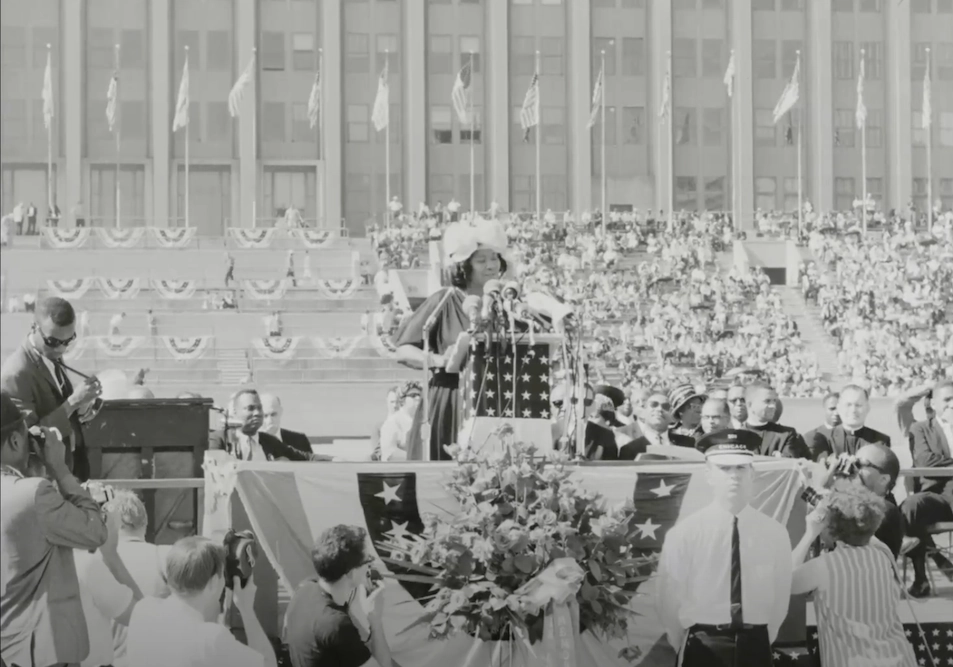Illinois Rally for Civil Rights, Soldier Field 1964.
On June 21, 1964, tens of thousands gathered at Soldier Field in Chicago for one of the most significant events in the American civil rights movement: the Illinois Rally for Civil Rights. Although the event is often mentioned in the context of the broader Chicago Freedom Movement, a campaign that took place in 1965–1966, this rally was a crucial precursor and a powerful sign of the ongoing civil rights efforts in the city and beyond. At the center of it all was Mahalia Jackson, whose powerful voice and tireless dedication had a profound impact on the movement.
Convening at a crucial time
The rally took place at a critical moment: the Civil Rights Act of 1964 was about to be passed by Congress. Just eleven days later, on July 2, 1964, President Lyndon B. Johnson would sign this historic legislation into law. The goal of the rally was to demonstrate the enormous public support for the bill, to underscore the unity of the civil rights movement, and to make clear that while passage of the bill was an important step, the work to achieve full racial equality was far from over.
An impressive demonstration of solidarity
Despite early morning rain and later oppressive heat, an estimated 57,000 to 75,000 people gathered at Soldier Field. This made the rally the second largest civil rights event in US history after the March on Washington in 1963. The sheer number of participants was an overwhelming testament to solidarity and determination.
The organization behind this mammoth event was impressive: nearly 150 different organizations promoted the rally and distributed 1.5 million flyers in Chicago to bring their members to the venue by bus. The keynote speakers for the day were Dr. Martin Luther King Jr., president of the Southern Christian Leadership Conference (SCLC), and Father Theodore M. Hesburgh, president of the University of Notre Dame. In his speech, Dr. King emphasized that while the passage of the Civil Rights Act had been a "long, long journey," "we still have a long, long journey ahead of us" to achieve true equality.
Mahalia Jackson – The "Voice of the Movement"
Mahalia Jackson, the world-famous "Queen of Gospel," played a central and unforgettable role in the rally.
Known for her deep support of the civil rights movement and her close friendship with Dr. King, she embodied the crucial role that women played in this struggle.
Mahalia Jackson led an impressive 5,000-strong gospel choir that opened the rally with two hours of uplifting gospel and jazz music. Her powerful voice and renditions of songs such as "Just a Closer Walk With Thee" and "I Am a Poor Pilgrim of Sorrow" drew countless people to the rally. She used her extraordinary talent not only to inspire people, but also to generate donations and publicity for the cause. Her involvement began in 1956 with the Montgomery bus boycott, where she sang for free and developed a deep friendship with King and his colleagues. She sang at the Prayer Pilgrimage for Freedom in 1957 and consistently insisted on integrated audiences at her concerts. Mahalia Jackson was one of the most prominent artists to put her art entirely at the service of the civil rights struggle and was an important source of support for Dr. King, who often found relaxation at her home in Chicago.
Significance and resonance
The Illinois Rally for Civil Rights demonstrated the enduring determination of the civil rights movement in the northern United States. The rally sent a clear message, particularly in Chicago, a city that has struggled with deep-rooted problems such as housing discrimination, educational inequality, and police brutality. The event was peaceful and successful, despite a small group of protesters outside the stadium.
Less than two weeks after this rally, President Johnson signed the Civil Rights Act of 1964, underscoring the rally's relevance as part of the push for legislative change. The rally was a monumental event that demonstrated massive support for equality and highlighted Mahalia Jackson's indispensable role as the "voice of the movement" through her inspiring musical performance.
It is important to note that Dr. King was also active in Chicago later on. On July 10, 1966, as part of the Chicago Freedom Movement, he led another significant rally at Soldier Field, the Freedom Sunday Rally. Here, too, tens of thousands gathered, and King made demands for fair and open housing, equal justice, and jobs. After this rally, 5,000 people, including Mahalia Jackson, marched to City Hall, where King posted a copy of their demands on a door. Mahalia Jackson also stood up for Dr. King in this case and supported his campaign in Chicago, even when parts of the African American church leadership rejected it, and even called Mayor Daley to enlist his support for King's speech.
The 1964 Illinois Rally for Civil Rights remains a shining example of the power of unity and peaceful protest in the fight for justice.
©Thilo Plaesser
VIDEO
„Just a closer walk with thee“ am 21. Juni 1964 - "Illinois Rally for Civil Rights"

© DVArchive-Retrofootage/Alamy